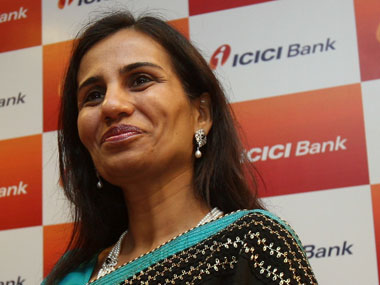If reports are to be believed ICICI Bank has backed its Managing Director and Chief Executive Officer Chanda Kochhar to get re-elected on the board of ICICI Securities even as multiple investigations are currently on regarding her alleged wrongdoings and conflict-of-interest in certain corporate loan deals. The bank should have waited for the investigations to get over and made sure Kochhar isn’t guilty before giving its vote of trust yet again. Under the present circumstances, this act of the bank, one of the largest lenders in terms of assets in the country, raises major questions on its corporate governance standards. Also, from a minority shareholder perspective, Kochhar’s return to the ICICI Securities board also revives an old debate about how easily majority shareholders with brute force can bulldoze concerns of minority shareholders amd have their way in company boards. Right now Kochhar is facing at least three different high-level investigations on alleged deals with Videocon group’s Venugopal Dhoot. None of these investigations have come to a final stage as this piece is being written. The outcome of an internal panel probe on Kochhar’s dealings under former supreme court judge Justice Srikrishna is pending. The Central Bureau of Investigation (CBI) has registered a preliminary enquiry into the Rs 3,250 crore loan dealing of ICICI Bank-Videocon group, which is at the centre of the accusations against Kochhar. As part of this probe, the agency has even asked Kochhar’s husband, Deepak and Venugopal Dhoot not to leave the country. Market regulator Sebi too has taken note of the allegations and is currently contemplating action against the Kochhars. Despite all these investigations that are underway, ICICI Bank has chosen to go ahead and back Kochhar’s reappointment on the board of ICICI Securities, where it has 79.22 percent stake. By doing so, the bank has missed a major opportunity to set an example of good corporate governance. It could have put Kochhar’s re-election on hold till the outcome of the probe. True, there is no technical hurdle against Kochhar’s re-election but what is undermined here is the spirit of good corporate governance. The bank, which has already taken a major reputation hit following allegations against Kochhar, should have taken cognizance of the situation and acted carefully for the simple reason that charges against its CEO aren’t insignificant by any yardstick. That’s why at least two large proxy firms InGovern and US-based Glass Lewis —recommended shareholders to vote against Kochhar’s re-election and appealed against it. [caption id=“attachment_2617026” align=“alignleft” width=“380”]  A file photo of Chanda Kochhar, MD & CEO, ICICI Bank. Reuters[/caption] But, that’s how, unfortunately, ICICI bank has dealt with the Kochhar episode throughout. It even resorted to a shield behind written clauses of the Company Act to say that “brother of a husband does not fall within the definition of a ‘relative’ under the Companies Act, 1956 or 2013 or the Rules thereunder, hence there is no requirement of any disclosure of such a relationship by any official of the Bank”. This was when Firstpost sent an email to ICICI Bank in April this year to seek clarity on the Kochhars alleged business relations with Singapore-headquartered Avista Advisory Group, a financial advisory firm founded by ICICI Bank MD and CEO Chanda Kochhar’s brother-in-law. Here again, technically, the bank is correct. But, what about the spirit of high standards of corporate governance by a banking giant dealing in public money? Kochhar is in trouble over her husband’s business dealings with Dhoot, who, in turn, was a large borrower of the bank she headed. According to a report in the Business Standard , the bank has replied to a show-cause notice by Sebi to say that it was not aware of the alleged conflict-of-interest situation and hence could not make adequate disclosures under the listing regulations. According to a letter by shareholder Arvind Gupta to authorities (including the Prime Minister’s Office) for wrongful personal gains, both the Kochhars and Dhoot acted in a non-transparent manner with respect to certain financial transactions. Gupta alleged that Videocon group promoter Dhoot floated an equal joint venture - NuPower Renewables Pvt Ltd (NRPL) - with Deepak, invested Rs 64 crore in the JV and later transferred the entire stake to Kochhar. Gupta then linked those transactions to a 2012 loan worth Rs 3,250 crore from the ICICI Bank to the Videocon group, and termed it as a possible quid pro quo deal. For argument’s sake, let’s say the board didn’t know about all this, shouldn’t Chanda Kochhar have informed the board about her husband’s business relations with Dhoot and recused herself? To sum up, ICICI board’s actions so far gives one enough hints to believe that the board attached more weight to its CEO, an individual in the top management, rather than the institution and the larger ideals of good corporate governance and shareholder concerns; something that might have prompted the board to give a clean chit to Kochhar immediately after allegations were made public, even before a thorough enquiry was done. Its actions, at a larger level, shows the sorry state of Indian companies’ corporate governance standards, maybe with a few notable exceptions.
ICICI board’s actions so far gives one enough hints to believe that the board attached more weight to its CEO rather than the institution and the larger ideals of good corporate governance and shareholder concerns
Advertisement
End of Article


)

)
)
)
)
)
)
)
)



